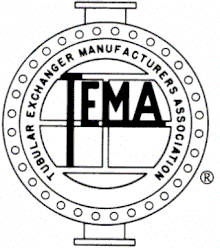Tubular Exchanger Manufacturers Association
The Tubular Exchanger Manufacturers Association (also known as TEMA) is an association of fabricators of shell and tube type heat exchangers.[1] TEMA has established and maintains a set of construction standards for heat exchangers, known as the TEMA Standard.[2]. TEMA also produces software for evaluation of flow-induced vibration and of flexible shell elements (expansion joints). TEMA was founded in 1939, and is based in Tarrytown, New York.[3] The association meets regularly to revise and update the standards, respond to inquiries, and discuss topics related to the industry.

The TEMA Standard
The current edition of the TEMA Standard is the Tenth Edition, published in 2019[4]. Worldwide, the TEMA Standard is used as the construction standard for most shell and tube heat exchangers[5][6][7]. The standard is composed of ten sections:[8]
- Nomenclature (see below)
- Fabrication Tolerances
- General Fabrication and Performance Information
- Installation, Operation, and Maintenance
- Mechanical Standards
- Flow Induced Vibration
- Thermal Relations
- Physical Properties of Fluids
- General Information
- Recommended Good Practice
TEMA Classifications of Heat Exchangers
TEMA's standard recognizes three separate classifications of exchangers[9][10][11]. Each class has different mechanical construction requirements, based on the expected service. Those classes are:
- Class R - for refinery and petroleum service
- Class C - for general commercial service
- Class B - for chemical process service
In general, Class C is the least restrictive class, and Class R is the most stringent, insuring more robust designs for longer life in harsher service conditions.[12]
TEMA Exchanger Nomenclature
Because heat exchangers can be configured many different ways, TEMA has standardized the nomenclature of exchanger types.[13] A letter designation is used for the front head type, shell type, and rear head type of an exchanger. For example, a fixed tubesheet exchanger with bolted removable bonnets is designated as a 'BEM" type. A kettle type reboiler with a removable U-tube bundle is a 'BKU' type. Many different letter combinations are possible.
Member Companies of TEMA
The member companies of TEMA must demonstrate high quality exchanger fabrication standards, and possess in-house engineering capability for mechanical and thermal design of shell and tube type heat exchangers. Companies may fabricate other equipment in addition to heat exchangers. The current member companies of TEMA (in alphabetical order) are:
- Brask, Inc.[14]
- Cust-O-Fab, Inc.
- Dunn Heat Exchangers, Inc.[15]
- Energy Exchanger Corp.[16]
- Fabsco Shell and Tube[17]
- Graham Corporation
- Heat Transfer Equipment Company
- Hughes-Anderson Heat Exchangers, Inc.
- Kennedy Tank and Manufacturing Co.
- Krueger Engineering & Mfg.
- Joseph Oat Corp.
- Ohmstede, Inc
- Perry Products
- R.A.S. Process Equipment[18]
- Southern Heat Exchanger[19]
- SPX Heat Transfer
- Steeltek, Inc
- Struthers-Wells
- Ward Vessel and Exchanger[20]
References
- Cheremisinoff, Nicholas P. (2000-07-30). Handbook of Chemical Processing Equipment. Elsevier. ISBN 9780080523828.
- "TEMA STANDARDS". www.thermopedia.com. Retrieved 2018-04-05.
- "TEMA Advantage". www.tema.org. Retrieved 2018-04-07.
- "TEMA Standards and Software". www.tema.org. Retrieved 2018-04-05.
- Editor, Andrew Sloley, Contributing. "Head Off Heat Exchanger Errors". Chemical Processing. Retrieved 2018-04-06.CS1 maint: extra text: authors list (link)
- Thulukkanam, Kuppan (2013-05-20). Heat Exchanger Design Handbook, Second Edition. CRC Press. ISBN 9781439842133.
- Hall, Stephen M. (2012-07-27). Rules of Thumb for Chemical Engineers. Butterworth-Heinemann. ISBN 9780123877895.
- "TEMA BOOK OF STANDARDS : TEMA BOOK OF STANDARDS". global.ihs.com. Retrieved 2018-04-07.
- Gupta, Jai Prakash (1989-11-01). Working With Heat Exchangers. Taylor & Francis US. ISBN 9781560320548.
- Sales, Kevin Sommerville – Vice President of. "Selecting the proper TEMA Type Heat Exchanger". Retrieved 2018-04-07.
- Stewart, Maurice; Lewis, Oran T. (2012). Heat Exchanger Equipment Field Manual: Common Operating Problems and Practical Solutions. Gulf Professional Publishing. ISBN 9780123970169.
- Towler, Gavin P.; Sinnott, R. K. (2013). Chemical Engineering Design: Principles, Practice, and Economics of Plant and Process Design. Elsevier. ISBN 9780080966595.
- Hall, Stephen M. (2012-07-27). Rules of Thumb for Chemical Engineers. Butterworth-Heinemann. ISBN 9780123877895.
- IEE, Brask, Inc. -. "Shell and tube heat exchangers, Heat exchanger manufacturer, Brask Inc - IEE, LA, South, Southern". www.ieeinc.net. Retrieved 2018-04-07.
- "Dunn Heat Exchangers, Inc". www.dunnheat.com. Retrieved 2018-09-26.
- "Energy Exchanger Company - Tulsa, OK". www.energyexchanger.com. Retrieved 2018-04-07.
- "Fabsco Shell & Tube - Fabsco Fin-Air". www.fabscollc.com. Retrieved 2018-04-07.
- RAS Process Equipment. "Engineering". www.ras-inc.com. Retrieved 2018-04-07.
- "SHECO | First Choice". www.sheco.com. Retrieved 2018-04-07.
- "Ward Vessel and Exchanger". wardvesselandexchanger.com. Retrieved 2018-04-07.